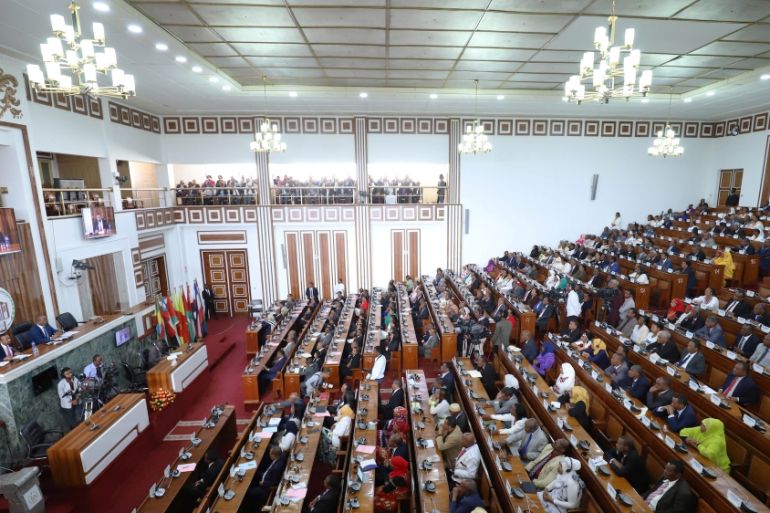Ethiopia passes controversial law curbing ‘hate speech’
Months before major election, Parliament passes law imposing jail terms for people whose internet posts stir unrest.

Ethiopia‘s parliament has passed a law punishing “hate speech” and “disinformation” with hefty fines and long jail terms, despite rights groups saying it undermines free speech months before a major election.
Nearly 300 legislators voted in favour of the bill on Thursday, with 23 votes against and two abstentions.
Keep reading
list of 3 itemsWhy Abiy Ahmed’s Prosperity Party is good news for Ethiopia
Does Ethiopia’s Abiy Ahmed deserve the Nobel Prize for Peace?
The new law defines hate speech as rhetoric that fuels discrimination “against individuals or groups based on their nationality, ethnic and religious affiliation, sex or disabilities”.
The new law permits fines of up to 100,000 Ethiopian birr ($3,100) and imprisonment for up to five years for anyone who shares or creates social media posts that are deemed to result in violence or disturbance of public order.
The law, however, says “dissemination” does not include liking or tagging such content on social media.
Legislators said the law is needed because existing legal provisions did not address hate speech and disinformation, and said it will not affect citizens’ rights.
“Ethiopia has become a victim of disinformation,” legislator Abebe Godebo said. “The country is a land of diversity and this bill will help to balance those diversities.”
Several legislators who opposed the bill said it violates a constitutional guarantee of free speech.

Ethnic tensions
Ethiopia has been experiencing sometimes deadly ethnic violence since June 2018, shortly after Prime Minister Abiy Ahmed announced sweeping political reforms for which he later was awarded the Nobel Peace Prize.
Ahmed has been praised for reforms hoped to foster a more open political and media environment. But domestic critics accuse him of authoritarian tendencies, including locking up political opponents.
The government says there is a need to legislate against hate speech, because it has been partly blamed for rising ethnic violence in the East African nation.
Tensions are expected to rise in advance of landmark elections due in August.
International rights groups say the law creates a legal means for the government to muzzle opponents.
“Politicians or activists or others will be forced to be cautious, afraid that their speech might fall into the definition of hate speech or can be considered as false information,” said Amnesty International’s Ethiopia researcher Fisseha Tekle.
In December, Human Rights Watch (HRW) had warned the law could “significantly curtail freedom of expression” in the country.
“Ethiopia should be removing legal provisions that restrict free expression, not adding more vague provisions that risk stifling critical public debate on important issues,” HRW’s Laetitia Bader said at the time.